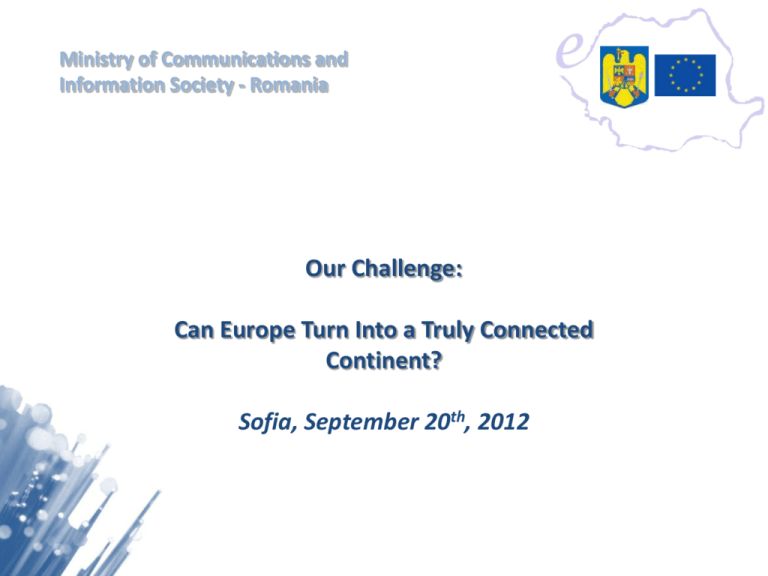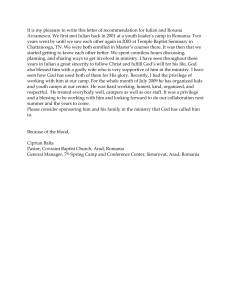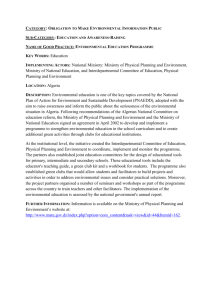Can Europe Turn Into a Truly Connected Continent?
advertisement

Ministry of Communications and Information Society - Romania Our Challenge: Can Europe Turn Into a Truly Connected Continent? Sofia, September 20th, 2012 Ministry of Communications and Information Society - Romania Albert Einstein’s Imaginary Answers to This Question: “A person who never made a mistake never tried anything new” “Learn from yesterday, live for today, hope for tomorrow. The important thing is not to stop questioning” “We cannot solve our problems with the same thinking we used when we created them” Ministry of Communications and Information Society Romania’s Approach & Solutions Over the Years Beginning Times • Pioneering • Pilots • Research Present Times • The most relevant projects for the European Union are also our priorities: broadband, security, innovation and public services. • Romanian relevant examples: PSC (Point of Single Contact), Electronic Procurement System, eCodex, Broadband National Infrastructure, Knowledge Based Economy Future • We are ready to take leadership in replicating KEP in European Union. • We have acquired during the last 8 years the necessary knowledge to replicate the Knowledge Based Economy Project that we successfully developed in Romania, European and International multi-awarded program. Ministry of Communications and Information Society PSC ROLE ePSC Platform: • the need to increase efficiency, access and trust in eGovernment • the need to implement the Services Directive (EC / 123/2006) with regard to the electronic Point of Single Contact and the electronic procedures • the need to increase the performance of public administration, by reducing administrative barriers and improving business Ministry of Communications and Information Society AVAILABLE SERVICES AND PROCEDURES After signing the protocols for the inter-institutional collaboration, the figures indicate the following progress: -36 Competent Authorities, including ministries and the majority of the central competent authorities -217 administrative procedures identified in the working groups, out of which 78 procedures have been configured within the Platform, and became operational through ePSC -74 people have participated in training sessions and received operator and administration certificates The platform is available at: www. edirect.e-guvernare.ro www.edirect.gov.ro Ministry of Communications and Information Society Prioritization of Services as recommended by the European Commission MCIS has set-up working groups in order to simplify the administrative procedures, and to facilitate the issuing of permits and licenses exclusively on-line, especially for the following priority sectors: • services for the establishment of a legal entity in Romania through integration with Trade Register’s portal • real estate; • veterinary services; • travel services; • health services; • financial services. Ministry of Communications and Information Society GENERAL ARCHITECTURE OF ePSC ePSC = interface between the citizen / business environment and the public institutions providing services Ministry of Communications and Information Society FEATURES OF PSC Identification/ authentication based on a qualified digital certificate of the issuing competent authorities in Romania and time-stamped in accordance with Law no. 451/2004 on timestamp The use of the electronic signature - during the configuration, the competent authorities may decide if documents should be requested or issued by means of the electronic PSC, as document signed with extended electronic signature, based on a qualified digital certificate of the issuing competent authorities and time-stamped. The possibility of accepting electronic payments; PSC is interconnected with the National Electronic Online Payment System with credit card (www.ghiseul.ro) Multilingual support: PSC receives multilingual support, thereby any procedure, formality or published information can be versioned and available in many languages Ministry of Communications and Information Society CERTs Structure – Cross-borders Connection Country A Different CERT Different CERT Country B • We daily change information cyber security related with our partners all over the world. • We usually receive about 50.000 to 100 .000 incident records regarding to suspect IP. The majority of them are suspected to part of botnets, this kind of networks being on growing. • We registered in our data base almost 380.000 IPs with suspicious activity from Romanian networks. Ministry of Communications and Information Society CERT’s Current Services Ministry of Communications and Information Society CERT’s Future Projects • • • • National Early Warning System Cyber-security Portal Cyber-Security Training Center Workgroups regarding national legislation and regulations: • National CyberSecurity Strategy. • Public online services security standards Ministry of Communications and Information Society WHAT IS THE ELECTRONIC PROCUREMENT SYSTEM? SEAP, the electronic system for public acquisitions, was launched on 4 March 2002 in a pilot version named “e-market”, with the support of MCIT. In 2006 the Government Ordinance harmonizing national and European legislation was issued in the field of public procurement. Following the harmonization of legislation, SEAP, in its current form, was developed to accommodate all new regulations imposed by the Ordinance to all actors in public procurement. www.e-licitatie.ro Statistics (17.09.2012) Registered Contracting Authorities Suppliers Published Catalog Products Awarded Acquisitions Total: 13,400 42,334 371,789 55,573,696,272.07 RON (~12, 4 billion €) Ministry of Communications and Information Society FEATURES AND BENEFITS SEAP is also the single point of sending notices to the Official Journal of the European Union, in electronic format. From its launch as pilot project, SEAP has become one of the most important e-government system in Romania. The system development implies standardized mechanisms of interoperability at European level. SEAP has played an important role in promoting information society technologies, Digital Agenda, such as using Internet tools and broadband networks, including in remote areas. The e-procurement transaction solution offers benefits for both the public institutions, and the private sector interested in this service, encouraging the investments of the communications providers in rural areas and the suppliers of digital literacy trainings. SEAP has opened the public procurement market for the national and European private sector, thereby creating and promoting a Single European Market, where a company may act independently of the Member State of origin. Continuous reduction of the procurement costs and significant savings to the state budget - in 2011 the acquisition costs were decreased with a total amount of over 3 billion €, based on a total of approximately 36,500 online and offline procurement procedures. Ministry of Communications and Information Society Future improvements of SEAP Romania’s experience in electronic procurement recommends SEAP as an example of best practice at regional level, both in terms of achievements and future directions of the system (PPP, DPS, interoperability etc.). • Permanent implementation of legislative changes with impact on public procurement • Development of PPP mechanisms in SEAP • Developing of the interoperability mechanisms of SEAP, according to the European standards • Implementation of the Dynamic Purchasing System Ministry of Communications and Information Society What is e-CODEX about? The e-CODEX project will aim at… Fostering the implementation of the EU legal framework and the e-Justice action plan, in accordance with the national implementation of that plan Achieving interoperability between existing national judicial systems Enabling all Member States to work together towards a more effective judicial system in Europe, avoiding the development of non interoperable e-Justice solutions, Improving the effectiveness and efficiency of the processing of the increasing number of cross border civil proceedings Contributing to a safer environment inside the EU for citizens Modernizing the judicial systems in Europe while at the same time to increase collaboration and exchange between judicial systems of the Member States Ministry of Communications and Information Society Expected Societal Challenges / e-Codex (18!) Partners + 5 new Member States versus Legal Community e-CODEX: pilots experiment (Social) Media IT Industry “Improved efficiency of cross – border judicial processes”. End Users “Easy and secure access to legal information and procedures”. “Greater cross-border effectiveness of legal processes”. Audience Ministry of Communications and Information Society Broadband – Core of the e-Development The purpose of the Ro-NET project: Developing an electronic network infrastructure (backhaul infrastructure) offering wholesale broadband services in all rural areas of Romania which are currently not served and where there are no plans for coverage in the next three years. Given the strong growth in demand for broadband services and the economics of public spending, the goal of intervention should support the adoption of basic broadband infrastructure, planned in such a way to allow and encourage the development of NGA networks in the future. The basic principles are: • Make interventions at the appropriate stage of market development; • Create a network with open access for all telecommunications companies (technically and organizationally); • Considerations of social development, consisting of accelerating deployment of new services to the public, provided by the public sector and requiring a broadband network; • Minimize entry barriers; • Stimulate and aggregate demand; • Compliance with state aid rules. Ministry of Communications and Information Society Broadband – Core of the e-Development Fixed Broadband Penetration Romania has 14% fixed broadband penetration rate in 2010, compared with 26,5% at EU27 level. As regards the total fixed broadband coverage Romania was ranked the second lowest in 2010, with 82% compared to 95% for EU27. Mobile Broadband Penetration Romania has a 4,3% mobile penetration rate in Romania compared to 7,2% for EU27. Internet Usage Despite a gradual increase over the past few years, Romania has the lowest rates of regular and frequent Internet use in the EU with 34% and 21%. In addition, 58% of Romanian citizens have never used the Internet, although this number has already decreased by 5 percentage points since 2009. On the whole, most Internet services are used to a significantly lesser degree than on average in the EU. Ministry of Communications and Information Society Broadband ROMANIA of the Knowledge based Economy Program Ministry of Communications and Information Society Knowledge Based Economy Program Knowledge Based Economy Project (KEP) is a strategic pioneering project for the Romanian knowledge society, the most extensive IT&C based project for rural Romania. Primary objective – ensuring social development by supporting digital access to information for creating knowledge capital with the help of IT&C. Beneficiaries - 255 knowledge-disadvantaged Romanian communities, 1.8 million citizens, 20% of rural Romanian population. Steps of implementation reducing the digital divide between urban and rural society by developing a Broadband Communications Infrastructure in 255 Communities developing the www.ecomunitate.ro portal, the most complex content site founded by the Romanian Government, where users transfer knowledge and generate digital content using web 2.0 technologies; promoting and providing local e-government services, stimulating entrepreneurial initiatives and local businesses. implementation of the ITC tools for digital literacy, introducing IT&C in the process of education in local schools and libraries, along with developing curricula; designing cultural projects and activities, in order to achieve a multiculturality local climate and addressing the Europeana initiatives. Ministry of Communications and Information Society Which are the main smart services offered by KEP, in accordance with the Digital Agenda? By introducing novelty solutions, every 255 KEP community delivers, basic and specific public services in correspondence with local and cross-over communities needs: • IT&C training services professionally certified • Assistance for online submission of files for agricultural funding • Assistance to local entrepreneurs (consultancy, web design) • Counseling services for accessing funds • Tourism information and promotion services • Online banking services • Job Club assistance Intelligent public service delivery. Ministry of Communications and Information Society Which are the achievements of KEP that lead to Digital Agenda for Europe 2020? Digital content and services shared through ecomunitate.ro portal, to build up a Digital Single Market. Interoperability and Standards IT&C infrastructure for all 255 k-deprived communities – Very Fast Internet for fast access to information. Three waves of sociological Research - strong pillars for identifying Innovative solutions for bridging the digital divide. Trainings, seminars, webinaries – 1.8 mil citizens have access to Digital Competences and e-Skills through national professional certification. Smart use of IT&C and information sharing through ecomunitate.ro platform represents a novelty solution facing Social Challenges. Digital Single Market Very Fast Internet Enhancing e-Skills IT&C for Social Challenges Ministry of Communications and Information Society What assures KEP’s sustainability and regional European extension, facing the DA 2020 ? Over the last few years, KEP Project has proved its impact at community, national and international level, based on the tailor-made services developed in every Local region. Curriculums for increasing the efficiency of IT&C services at local administrative level. Counseling Centers & Guides for attracting funds al local level. National cultural incubators for consolidating the communities’ local patrimony. Centers of Assistance & Research in professional training and Job application. Tourist Points based on digital media content of rural attractions. Empowering vulnerable communities for an ambitious strategy plan of Digital Agenda implementation. Ministry of Communications and Information Society What instruments do KEP uses? A unique initiative in Romania, www.ecomunitate.ro is the most complex content site founded by the Government. The portal was launched in 2009 as the main communication tool for the Knowledge based Economy Project. Why Web 2.0 & OER (open educational resources)? ecomunitate.ro facilitates community interaction, knowledge sharing and knowledge transferring, for building community, scholar and business partnerships using Open Resources. Web 2.0 stands as an advanced technology resource, empowering deprived users to build up informational bridges and to generate informational content via social media. 2.6 mil visits 4.6 mil pages visited 1 mil unique visitors 4.000 informational resources (success stories, articles, news & events, images, blog posts) 2.000 educational resources Ministry of Communications and Information Society What are KEP’s directions in Education? Technical Assistance Project for IT&C use in schools and libraries. Targeting 30% of disciplines learned with web 2.0 and OER in schools from 4 curricular areas. Counselling and assistance for local schools in attracting external funds. Educational projects generation for building a higher pedagogical capacity. Designing skills incubators among every community that delivers Digital Agenda tailoredlabels. Expected results: - National Guide for integrating IT&C in schools; - National Guide for teaching, using Web 2.0 and OER ; Alignment with European educational policies through IT&C solutions. Ministry of Communications and Information Society What is KEP doing for EUROPEANA? Romanian contributions for European culture Delivering grants for deprived communities, in order to develop cultural projects by the public libraries and school libraries. Designing virtual artifacts based on local habits, traditions & patrimony and deliver them to Europeana platform. Developing new digital services for the local libraries towards offering accessibility to eBooks, audioBooks and eBook Readers. Increasing the role of the local librarian from a provincial citizen, to a culturalized human resource, an important pillar for the community and its inhabitants. Exploring local cultural backgrounds for building cultural knowledge within an European habitat. Ministry of Communications and Information Society Thank you!






